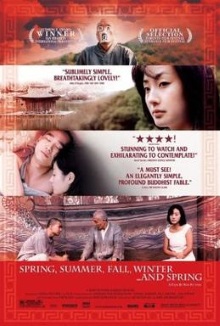
I can’t remember why I added this to my list and I’m pretty sure I’ve never watched anything by director Kim Ki-duk before but this is listed among some polls as one of the best films ever made so I suppose that’s reason enough. The title is very long and feels rather generic given how common this metaphor is but it does turn out to be very fitting.
The seasons of the title each refer to different periods of a Buddhist monk’s life, separated by a decade or more. First, the film shows him being raised and taught by his master at a tiny monastery in the middle of a lake. He has free run of the valley and is familiar with the plants and animals in it. However one day he tortures animals by tying a stone around each of time and his master chides him for it by doing the same thing to him. The second part of the film shows him as a young man as the monastery welcomes a young woman who has come to stay with them in order to recover from an illness. The young man feels lust and eventually has sex with the woman. When the old master discovers this he warns his apprentice that lust leads to the desire to possess and that in turn leads to murder. Announcing that the woman is cured, the master sends her away but the apprentice cannot bear to live without her and runs away as well. Time passes and the old master notices in the newspaper an article about a man who has fled after killing his wife and he realizes that his apprentice will return soon.
The entire film takes place only within the confines of the valley. There are only a handful of characters and there is very little dialogue. It can be a little frustrating at first as the film offers so little information but once we discern the cyclic pattern of the story, we realize that all that we see happening has happened before. This is probably one of the films with the strongest Buddhist themes I’ve yet seen and at its best, there are moments when it does manage to capture the profound sublimity of religion. The serenity of the monastery and its valley make for a beautiful backdrop and though it’s an overused trope, the wise and patient master here is very convincing and sympathetic. I especially like how Buddhist themes are infused throughout the entire film but there is no attempt to lecture the audience. Instead the messaging is largely visual and some is subtly implied. For example, it was moving to realize that apprentices shouldn’t harm the animals living in the valley as they might hold the souls of the previous generations of monks who ran the monastery. Perhaps best of all is the film’s willingness to embrace imperfections and flaws. We can infer from the sins and mistakes of the apprentice that the old master may have a similarly sordid past.
Unfortunately the film falls a little short of being truly great. Though its treatment of morality is mature, the director’s inability to resist adding in Buddhist mysticism feels juvenile. A more subtle form of it, as with implying that the old master has been reincarnated into a snake, is fine. But the film clearly shows the he has developed some kind of supernatural control of the valley. While that explains why he can seemingly go anywhere he wants even though they only have a single boat and the apprentice has taken it, it feels silly. Towards the end they even have the now adult apprentice discover a martial arts manual in the temple and practise the forms there, making the film look like a cheap kungfu movie. I’m also skeptical such a portrayal is in line with the Korean conception of Buddhism. Such scenes harm the overall tone and make it feel less serious.
Mistakes aside, this is still one of the best Buddhist films I’ve seen, not that there are a lot of them. I’m not sure what it means exactly but the fact that they appear to have a different animal as a pet in each season is probably significant and makes it feel even more Buddhist. The valley it’s shot in is beautiful and whole film feels like a compact, closed loop which I found to be very neat.